I would like to implement Csrf protection with NestJS and Quasar. But I think I misunderstand something... btw I'm not doing SSR, so I don't send the form from the back to the view.
Here is the NestJs back-end code:
async function bootstrap() {
const PORT = process.env.PORT;
const app = await NestFactory.create(AppModule, {
cors: true,
bodyParser: false,
});
console.log(`your App is listening on port ${PORT}`);
// Added Cookie-parser to user csurf packages
// Prevent CSRF attack
app.use(cookieParser());
app.use(csurf({ cookie: true }));
await app.listen(PORT);
}
bootstrap();
So I'm just using CookieParser and csurf package. On my login page I call a "csrf endpoint" just to send a cookie to the view, to send it back with the post call (login). I still get the "invalid csrf token" AND a CORS error and don't know why....(see screen below), any suggestions to make it works ?
When I try to login, error in the browser:

And error in the back-end:
Same error if I try a request with insomnia. I thought that the CSRF token is attached to the "web browser" to go back to the back-end with nest request, so why I'm still getting this error ? Insomnia send the cookie automatically with the right request so the token should go back to the back-end. Any idea ? Regards
EDIT: After many times reading docs, It seems that CSRF protection is for SSR only ? No need to add csrf security with SPA ? Could anyone can confirm ?
EDIT: Here's another work:
The purpose here is to send a request before login to get a csrf token that I can put into a cookie to resend when I login with a POST method.
Here is my endpoint:
import { Controller, Get, Req, Res, HttpCode, Query } from "@nestjs/common";
@Controller("csrf")
export class SecurityController {
@Get("")
@HttpCode(200)
async getNewToken(@Req() req, @Res() res) {
const csrfToken = req.csrfToken();
res.send({ csrfToken });
}
}
Here is what I've done into my main.ts file (I'll explain below):
async function bootstrap() {
const PORT = process.env.PORT;
const app = await NestFactory.create(AppModule, {
cors: {
origin: "*",
methods: ["GET,HEAD,OPTIONS,POST,PUT"],
allowedHeaders: [
"Content-Type",
"X-CSRF-TOKEN",
"access-control-allow-methods",
"Access-Control-Allow-Origin",
"access-control-allow-credentials",
"access-control-allow-headers",
],
credentials: true,
},
bodyParser: false,
});
app.use(cookieParser());
app.use(csurf({ cookie: true }));
console.log(`your App is listening on port ${PORT}`);
await app.listen(PORT);
}
bootstrap();
And here my axiosInstance Interceptors of the request in my VueJS frontend:
axiosInstance.interceptors.request.use(
(req) => {
const token = Cookies.get('my_cookie')
if (token) {
req.headers.common['Authorization'] = 'Bearer ' + token.access_token
}
req.headers['Access-Control-Allow-Origin'] = '*'
req.headers['Access-Control-Allow-Credentials'] = 'true'
req.headers['Access-Control-Allow-Methods'] = 'GET,HEAD,OPTIONS,POST,PUT'
req.headers['Access-Control-Allow-Headers'] =
'access-control-allow-credentials,access-control-allow-headers,access-control-allow-methods,access-control-allow-origin,content-type,x-csrf-token'
const csrfToken = Cookies.get('X-CSRF-TOKEN')
if (csrfToken) {
req.headers['X-CSRF-TOKEN'] = csrfToken
console.log(req)
}
return req
},
(err) => {
console.log(err)
},
Here the same for repsonse:
axiosInstance.interceptors.response.use(
(response) => {
if (response?.data?.csrfToken) {
const {
data: { csrfToken },
} = response
Cookies.set('X-CSRF-TOKEN', csrfToken)
}
return response
},
And inside my login I make a call on the mounted function of my login component:
async mounted() {
const result = await securityService.getCsrf()
},
So now to explain:
As I said I'm not building a SSR project, that's why I want to send the token into a classic axios reponse and store it in a Cookie (this part is for test I heard that storing a csrf token into a classic cookie is not the right way.) And for each next request I get the csrf token and "attach" it to the request into the headers, making my headers "custom". Here is a problem I don't know how to make custom headers works with nestJS and CORS, that's why I try many thing with CORS options in NestJS and writte some custome header before the request go to the back-end but without success, I've got the same error message:
I'm a bit confuse about this problem and CORS/CSRF is a big deal for spa, my questions still the same, with CORS and SameSite cookie attributes, and my api is in a subdomain of my front-end, is it really necessary to make a anti-csrf pattern ?
Btw how can I make my custom headers working and why CORS say to me there is no "Access-Control-Allow-Origin" header but there is:




